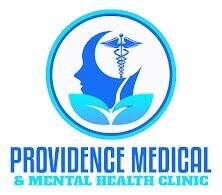Bipolar Disorder Specialist

Bipolar Disorder
Bipolar disorder causes mood swings, but the severity of your symptoms depends on the type you have. Dr. Esther Eke-Huber, PhD, APRN, ANP-C, PMHNP-BC, and the team at Providence Medical & Mental Health Clinic diagnose and treat bipolar disorder, providing mood-stabilizing medications and psychotherapy that gives you the skills you need to live a satisfying life. If you experience challenging mood swings, call the office in Houston, Texas, or book an in-person or telemedicine appointment online today.
What is bipolar disorder?
You may know bipolar disorder by its original name: manic-depressive disorder. However, there are different types of bipolar disorder with variations on the extreme manic-depressive swings.
Bipolar I disorder
Bipolar I disorder is the original manic-depressive disorder. You have manic (high energy) episodes that last at least one week or cause severe symptoms that require hospitalization. You also have episodes of major depression.
Bipolar II disorder
Bipolar II disorder is defined by episodes of hypomania and major depression. Hypomania is less severe than mania, allowing most people to keep up with their daily responsibilities.
Cyclothymic disorder
This type of bipolar disorder causes frequent mood swings with symptoms that are less severe than hypomania and major depression.
What symptoms does bipolar disorder cause?
During a full-blown manic episode, you:
- Have high activity levels
- Have excessive physical energy
- Need less sleep
- Talk rapidly
- Experience racing thoughts
- Have an exaggerated sense of importance
- Engage in risky behaviors (e.g., overspending or driving while drinking)
In severe cases, you can experience delusions or hallucinations.
During an episode of major depression, you:
- Have low energy and fatigue
- Feel hopeless, sad, and worthless
- Have difficulty focusing
- Withdraw from friends and family
- Lose interest in your favorite activities
- Sleep more or less
- Eat more or less
- Have suicidal thoughts
You may also experience physical symptoms such as headaches, muscle aches, and stomach aches.
How is bipolar disorder treated?
The team at Providence Medical & Mental Health Clinic offers patient-centered services, with a focus on building trust and providing individualized care that meets each person’s needs.
The treatment for bipolar disorder typically includes two components: medication and therapy:
Medication
Mood-stabilizing medications are essential for most people with bipolar disorder. These medications control mania and depression and may prevent a relapse once your mood stabilizes.
Psychotherapy
Talk therapy supports the aspects of your life that bipolar disorder disrupts. For example, you may need help restoring or building relationships, learning the signs of an approaching mood swing, dealing with emotions, and reducing stress.
Since the team also has a unique dual-focus on medical and mental health care, they offer comprehensive care for bipolar disorder. They also refer you to a psychiatrist or other medical specialist when needed.
Call Providence Medical & Mental Health Clinic or use the online booking feature today.
